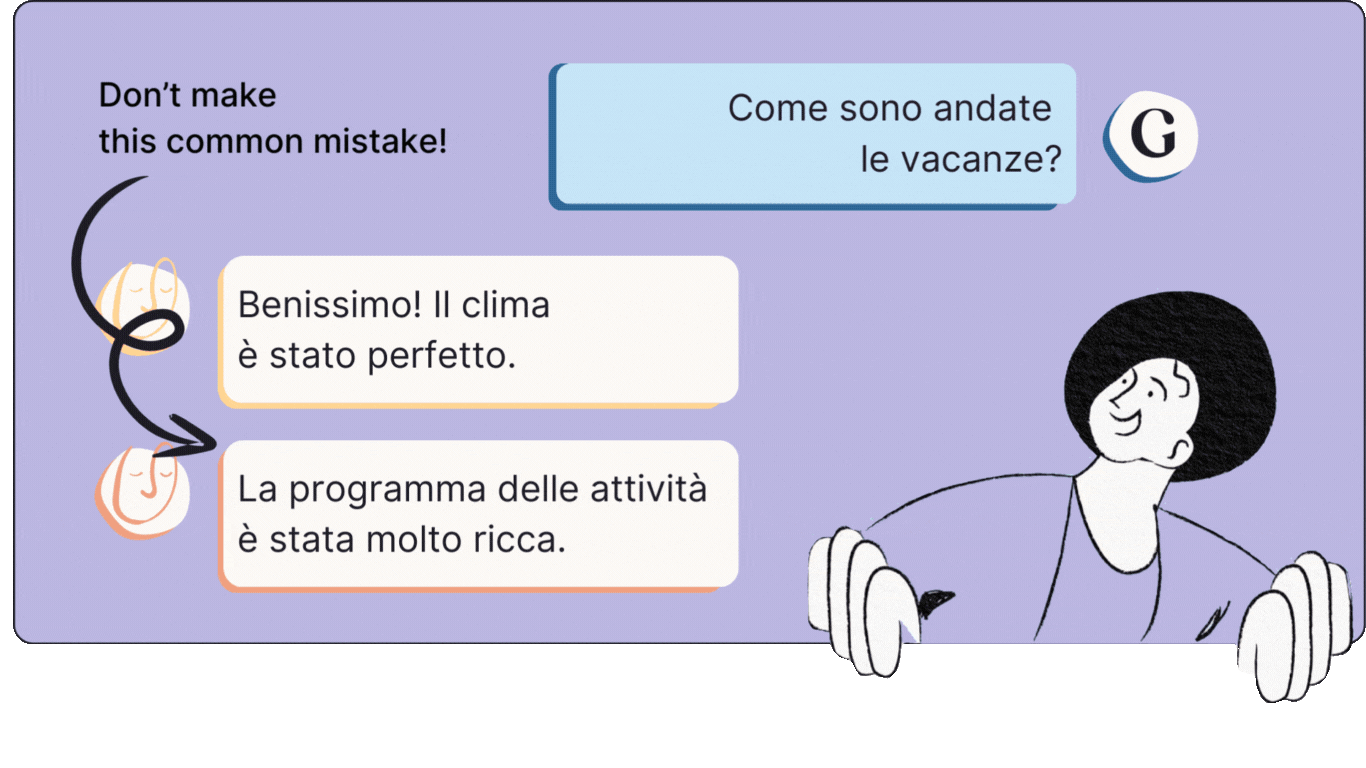Read this short email 👇
Cara Anna,
Abbiamo trascorso due settimane in un villaggio turistico immerso nella natura. Il clima è stato perfetto, con giornate calde e soleggiate. Anche il programma delle attività è stato molto ricco: escursioni, momenti di relax e feste serali. Le feste hanno sempre avuto un tema esotico. Pensa! Una sera per una festa in maschera ho indossato un boa di piume fucsia. Durante la festa c’è stato un problema con la corrente elettrica. È andata via la luce e al buio ho inciampato e sono caduta. Ancora adesso ho un ematoma sul ginocchio! I tecnici non sono riusciti a risolvere il dilemma. Ma il cielo era pieno di stelle e abbiamo potuto ammirare le costellazioni e il pianeta Venere!
Un abbraccio,
Caterina
📚 Masculine or Feminine?
In Italian, most nouns ending in -a are feminine; however, particular groups of masculine words end in -a in the singular and -i in the plural.

📌 Words ending in -ma
These are words of Greek origin. The most common are:
• Il tema → i temi
• Il sistema → i sistemi
• Il clima → i climi
• Il problema → i problemi
• Il dramma → i drammi
• Il dilemma → i dilemmi
• L’enigma → gli enigmi
• Il poema → i poemi
• Il trauma → i traumi
• Il teorema → i teoremi
• Lo schema → gli schemi
• Il diploma → i diplomi
• Il magma → ✖️ (only used in singular)



📌 Words ending in -gramma and -oma.
These are also words of Greek origin.

👉 In ancient Greek, -gramma means 'written,' so all words ending in -gramma refer to the meaning of 'writing.' Observe the following examples:
• Il programma → i programmi
• Il pentagramma → i pentagrammi
• L’elettrocardiogramma → gli elettrocardiogrammi
• L’anagramma → gli anagrammi
• Il diagramma → i diagrammi
• Il telegramma → i telegrammi
• L’organigramma → gli organigrammi
• L’epigramma → gli epigrammi

👉 In ancient Greek, -oma has a meaning of 'swelling' and 'inflammation' and is used in many medical words:
• L’ematoma → gli ematomi
• Il genoma → ✖️ (only used in singular)



📌 A very common masculine word ending in -a is the word pianeta:
• Il pianeta → i pianeti

📌 Names of some animals that remain invariable in singular and plural
• Il boa → i boa (word of Latin origin)
• Il cobra → i cobra (word of Latin origin)
• Il puma → i puma (word of Latin-American origin)
• Il koala → i koala (word of Aboriginal origin)
• Il gorilla → i gorilla (word of Greek origin)
• Il panda → i panda (word of uncertain origin)



🚨 Pay attention to concordanza
Don't be fooled by the -a ending of masculine nouns.
Besides the correct article, it's also important to have agreement between the nouns and adjectives, which, in this case, must be masculine.
Observe these sentences:
• Il problema è delicato;
• L’anagramma è complicato;
• L’ematoma sul ginocchio è ancora molto esteso;
• Nettuno è il pianeta più lontano dalla Terra.

Come for the grammar.
Stay for something much bigger!
Join our community and receive a daily Italian word, insights about Italy and its culture, and a weekly grammar lesson. Unlock exclusive perks and immerse yourself in a stereotype-free learning environment—straight to your inbox.
